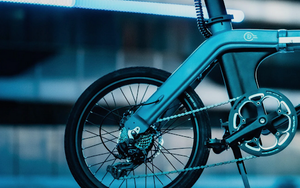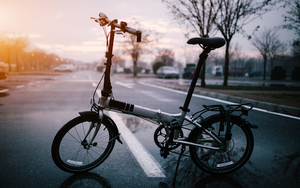Are Electric Scooters Legal in Liverpool?
Aug 22, 2024
Electric scooters have become a popular mode of transportation in recent years. With their compact size and eco-friendly nature, they offer a convenient and sustainable alternative to traditional vehicles. However, their growing presence on the streets has raised questions about their legality, particularly in cities like Liverpool. In this article, we will delve into the intricacies of electric scooter legislation in Liverpool and explore the impact they have on the city and its residents.
-
Understanding the legalities of electric scooters
-
The debate around electric scooter legality
-
Impact of electric scooter on Liverpool
-
The future of electric scooters in Liverpool
-
Conclusion
Understanding the Legalities of Electric Scooters
Before we delve into Liverpool's specific regulations, let's take a moment to understand the current state of electric scooter legislation in the UK. Electric scooters, also known as e-scooters, fall under the category of Personal Light Electric Vehicles (PLEVs). These vehicles are not legally allowed on public roads, cycle lanes, or pavements in the UK unless they comply with certain criteria.
It's important to note that the laws surrounding electric scooters are constantly evolving as authorities grapple with the challenges and opportunities presented by this emerging mode of transportation. The debate often centres around issues of safety, infrastructure compatibility, and the need for clear regulations to govern their use.
The Current Legislation on Electric Scooters
In the UK, electric scooters are classified as motor vehicles, which means they must meet the necessary requirements to be used legally on the roads. This includes having insurance, road tax, a valid MOT certificate, and being registered with the DVLA. However, the majority of electric scooters available for purchase do not meet these requirements, making them illegal to use on public roads.
Enforcement of these regulations varies across different regions, with some areas cracking down on illegal e-scooter use through fines and penalties. The lack of clarity and uniformity in the legal framework has led to confusion among riders and authorities alike, highlighting the need for a comprehensive and standardised approach. Despite this, there are still thought to be over 750,000 private electric scooters in use within the UK.
How Liverpool Interprets the Law
While the use of electric scooters on public roads is generally prohibited, some cities in the UK have taken part in government-backed trials to assess the feasibility and impact of legalising their use. Liverpool launched their e-scooter hire scheme in 2020 with Voi, and within the first year had 1.4 million rides which replaced an estimated 600,000 short car journeys and reduced 328 tonnes of CO2 in Liverpool.

The Debate Around Electric Scooter Legality
The legality of private electric scooters is a topic of much debate among policymakers and urban planners. Supporters argue that legalising electric scooters would encourage the transition to greener transportation options, reduce congestion, and improve air quality. On the other hand, opponents voice concerns over safety, as well as issues related to the lack of infrastructure and potential conflicts with pedestrians.
Arguments for Legalisation
Proponents of legalising electric scooters in Liverpool argue that it would provide a convenient and environmentally friendly mode of transportation for both residents and tourists. With their electric motors, e-scooters produce zero emissions, contributing to the city's efforts to combat air pollution and reduce carbon emissions. Additionally, their compact size allows for easy manoeuvrability in congested areas, further alleviating traffic congestion. The Riley RS1 V2 makes for easy transportation and prioritises safety with triple braking systems and bright LED lights.
Arguments Against Legalisation
Opponents of electric scooter legalisation raise concerns over safety and the impact on pedestrian spaces. Without proper education and enforcement of traffic rules, there is a risk of accidents involving e-scooter riders and pedestrians. Furthermore, the lack of designated infrastructure, such as dedicated bike lanes, could lead to conflicts between different road users.

Impact of Electric Scooters on Liverpool
The use of electric scooters in Liverpool, both legal and illegal, has had several implications for the city and its residents. Two significant considerations are traffic and congestion as well as environmental impact.
Traffic and Congestion Implications
Electric scooters, when operated safely and legally, can contribute to reducing traffic congestion in urban areas. By providing an alternative to cars and taxis, they alleviate the number of vehicles on the road, leading to smoother traffic flow. However, the presence of illegal electric scooters adds to the existing congestion rather than alleviating it. This emphasises the importance of implementing appropriate regulations and enforcement measures.
Environmental Considerations
As previously mentioned, electric scooters offer an eco-friendly solution for short-distance travel. With zero emissions, they help reduce air pollution and mitigate the negative effects of carbon emissions on the environment. By embracing electric scooters as a viable means of transportation, Liverpool could work towards achieving its sustainability goals and improving the overall quality of life for its residents.

The Future of Electric Scooters in Liverpool
While electric scooters are currently illegal in Liverpool, the future may hold potential changes in legislation. As other cities across the UK and worldwide explore the benefits of e-scooters, Liverpool may reconsider its stance and join government trials to assess their viability. These trials could provide valuable insights into the impact of electric scooters on urban mobility, paving the way for future integration.
Potential Changes in Legislation
If Liverpool were to adopt a more lenient approach towards electric scooters, it would require careful consideration of the infrastructure and regulations necessary for their safe and proper use. Implementing designated bike lanes and educating riders on responsible scooter use would be crucial steps towards ensuring the successful integration of electric scooters into the city's transportation network.
The Role of Electric Scooters in Future Urban Mobility
Electric scooters have the potential to play a significant role in future urban mobility. As cities strive to reduce car dependency and embrace sustainable transportation options, e-scooters offer a viable solution for short-distance travel. Integrating electric scooters into Liverpool's transportation network could contribute to a more efficient and environmentally conscious city.
Conclusion
In conclusion, electric scooters remain illegal in Liverpool, aligning with current UK legislation. While the debate surrounding their legalisation continues, it is essential to weigh the potential benefits against the challenges they may pose. As Liverpool seeks to create a greener and more accessible city, electric scooters could contribute to a sustainable future if appropriate infrastructure and regulations are put in place.






